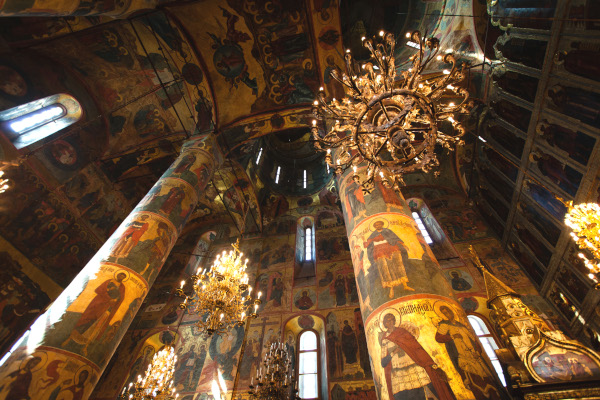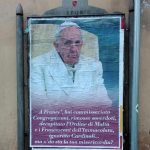This celebration is so special that in some countries, including Italy where I live, it’s a public holiday.
Solemnity of the Assumption of the Blessed Virgin Mary
Mass during the Day
This is to celebrate the concept that, by unique privilege, Our Lady is proclaimed to be already in Heaven in body and soul, anticipating the undeserved destiny of us creatures spoiled by the Original Sin. If we can make it, we’ll have to wait for the end of the world for the resurrection of our body.
You may have been brought to believe that the Assumption was a recent Catholic invention, given that the dogma of the Assumption of Mary was solemnly proclaimed by Pius XII in 1950,
but behold, here’s none other than the Kremlin, in Moscow:

This is a richly decorated cathedral dedicated to Dormition of Mary.
There is in fact a deep-rooted tradition, particularly in the Orthodox world, which would even affirm that Mary didn’t even die, but went through a sort of deep sleep instead.
I honestly wouldn’t go that far (also consider an almost painless death, which looks quite similar to falling asleep, is sometimes possible, hence how different would that appear?) but you never know.
Be that as it may, for the Orthodox August 15 is the Dormition Day.
Now this singular privilege of the Virgin Mary, for the modern mentality is problematic; I think I can’t be that far off by saying that, even for believers, this dogma and its celebration are accepted, but barely so, with a sort of mental reserve. For most, if they had to give reasons for it to an unbeliever, I think a sort of embarrassment would emerge.
So let’s analyze what I think are the reasons for this difficulty, which I would identify as follows:
- privilege collides with our deeply rooted modern mindset revolving around democracy, which presupposes equality;
- it comes from a tradition rather than directly from Scripture;
- to say that “she’s already” in Paradise seems to naively imply there’s absolute time, a reference frame that goes beyond this universe, even involving eternity;
- this seems “excessive”: a triumphalistic declaration, which adds nothing to faith but shows the self-referential nature of a Church that in 1950 was unaware of its imminent decline, caused by a dramatic clash with modernity. That’s why, the story would go, they could get mired in doctrinal shifting sands while ignoring current problems and emerging sensitivities.
Can you appreciate why I consider the present article series important? In sermons you could hear at church, everybody expects the usual platitudes; with your mere presence you’re signaling that you’re passively accepting the usual premises.
It would feel totally out of place to even bring forward the concept of questioning the meaning and credibility of the dogma itself.
Hence disbelief remains an ubiquitous yet undeclared presence: almost invisible, bubbling under the surface. Doubts are never addressed.
Let’s give this some thought, then.
Scriptural?
Here we go, again: a New and Updated Christianity claimed to be able to rediscover the original message from the Gospel, freeing it from the contamination caused by centuries of Church life, from alleged arbitrary additions and filthy superstitions. They should face the banal observation that something that truly comes from God cannot be subverted in such a radical, profound and seamless way. If the devotion to Mary is so ancient, well attested, widespread, defended with passion, just give up already: either Christianity is necessarily that, or it’s a false religion.
It’s more than a stretch to pretend to find answers to any pressing question on our faith (and beyond) in the letter of a text that is not only short and essential, but could not be otherwise. But this is a complex topic and right now we have other pressing issues.
Even the most intransigent Protestants are forced, if they got a minimum of proper education, to rely on the Fathers of the Church and the first ecumenical councils to get to a basic understanding and draw some inferences, coming to a coherent doctrine, which indeed implies some common ground. Under such premises, they have to assume a sketchy and never explained transition (when?) from the mythical Church of the Origins to the dreadful Catholic Church.
Christian faith and doctrine are based by design on theologians’ musings, some of which coming quite late. And it’s not based on the opinions of fashionable theologians, embraced by the secular world. It’s based on ideas coming from the mouth of saints, who were often swimming against the tide.
The last two dogmas that were proclaimed, the Immaculate Conception and the Assumption, are just a ripe fruit of this process. But, as mentioned, their origins come from the earliest centuries.
The appropriate line of reasoning, therefore, stems from essential foundations we find implicitly in the text; their specific weight, far from trivial, cannot be denied, even if one could easily miss them entirely, through a hasty reading.
Giving a creature like Mary the role of mother of God is absolutely shocking, difficult even to contemplate. The Scripture, if we don’t consider more indirect clues, “just” tells us she’s full of Grace. The grace of God, which brings her unique gifts. Living 9 months in symbiosis with Jesus, this is a dizzying dimension, in many ways not yet explored in reflection.
Another concept that has to be explored: if the corrupt nature of this world is closely linked to what we are, sinners… Gifting Mary with absolute purity (being free from Original Sin), combined with his choice to stay her entire life away from sin, is bound to lead to a unique condition also for the end of her life. In fact death and the corruption of corpses are part of this degenerate nature, of this universe. It’s certainly conceivable that she was spared this affront.
Would it have occurred to me to give Our Lady this extra gift, to be taken directly to Heaven, as a first-fruit? No, absolutely. I believe the same goes for most of us. But we haven’t spent a lifetime studying, praying and meditating on those mysteries. And we aren’t saints.
Then again, our knowledge of any document or belief from the first century is more than fragmentary, incomplete. Hence it shouldn’t surprise us that the first traces we got of this doctrine date back to the fourth century.
Remember, however, that in addition to the text of the NT manuscripts there’s also the testimony of other sources and archeology, and there are no traces of the tomb of Mary, which otherwise would have occupied a prominent place in the worship practices of the early Church. All we get are churches dedicated to the Dormition.
Too much?
St. Louis-Marie Grignion from Montfort wrote:
It is right and right to repeat with the saints: De Maria nunquam satis
and even if, as I read, the Latin phrase he cited is tentatively attributed to Saint Bernard de Clairveaux, and is indeed expressing a widespread sentiment, it is not known where the citation came from.
“Of Mary we can never say enough”, this is the translation of the Latin motto. Honestly, as a phrase I don’t like it, it may be misunderstood and may exalt naive meddlers, wannabe seers and the like. Yet on a future occasion I’ll have to try -in my own small way- to explore the unique role of Mary in the plan of salvation, which goes almost unrecognized today.
As I said before: our embarrassment, in the face of these Marian mysteries which look “too good to be true” (and seemingly unnecessary) has no reason to exist, because this devotion is an established fact. As a consequence, it can be considered inappropriate only if it does not come from God… If such a momentous error could prevail, then we’d be poor wretches, as St. Paul said: that would mean Jesus didn’t really rise from the dead; our faith would be in vain.
We Catholics may feel a sense of inferiority towards Protestants and skeptics in general, but basically the reason is cultural: we are used to a world where certain excessively Catholic things are snubbed or derided. They accuse us of triumphalism but in reality we hide in the basement and if they step on our foot we hastily apologize for that.
Does this dogma treat time like an absolute?
OK, maybe it’s always been a problem just for me… But have you ever heard a speech on Purgatory or Heaven where allegedly the deceased are “now” praying, purifying themselves if applicable, maybe looking at us in this very moment?
Today we know that the flow of time isn’t uniform, there is no common clock for all the objects of this universe: if you move away quickly enough your time will flow slower. But even for those who had no knowledge of Relativity, it would have been easy to get this: how can you pretend to have a common time frame, shared with the saints in Heaven? Can we really entertain the thought that even in Heaven they now got to 2023?
And consequently: if we understand eternity, in what sense we could say that Our Lady arrived in Paradise “before” the rest of us?
If we don’t get rid of these mental references, we will easily fail and get ridiculed; ending up taking for granted – among other things – that Church Fathers would not ask themselves these questions. It would be interesting to see a filmed experiment, a candid camera where some atheist militants would get outside churches after mass and ask the faithful pouring out of the gates some insidious questions on these issues: most would certainly fail spectacularly. That’s why we desperately need more learning opportunities.
Well, at the very least Saint Augustine (again in the fourth century) dealt with the problem of time; if you take into account the language and mentality of that distant era, he gave a surprisingly refined and modern answer. Time is not absolute, it is part of creation; there’s no point in asking what comes before. God is outside this flow, he is beyond.
I would add: our nature is linear; however, even considering the promised eternal life may consist of a transformation of who we are, it isn’t that far fetched to imagine that we’d bring some aspects of our being into this greater reality, in some way: we could get, beyond death, a possibility for us to live (in part?) through dimensions similar to time. At least Purgatory, being a process of purification, could perhaps have a development that we may picture as one or more temporal sequences, perhaps lived in parallel.
And so it could be pleasant, appropriate, wanted… that some aspects of the existence of those in Heaven may be lived in parallel with our earthly lives, in a sort of brotherly closeness. As an opportunity, a gift, to experience a common journey, to communicate love and share the flavors of our way of being.
So… once absolute time is pushed out the door, could something analogous come back through the window? A sort of communication, or closeness, between time and eternity. Making present to us what in and of itself would be far beyond reach. Why not? These are still conjectures.
Well, one could interject… What does Mary have to do with it? Actually the idea of the body that was “already” risen does not complicate the picture, it simplifies it. That’s because the resurrection of the body calls into question this world of ours, with absolute concreteness. Here’s an event in time, something that happened then: there’s no corpse. That specific matter, atoms and molecules, Mary’s body: it’s not here.
Our body, or whatever remains of it, is immersed in spacetime; but not in her case.
Then this specific Christian theme returns: we’re not meant to flee this reality to get to a world of ideas; instead, somehow matter is involved in God’s plan!
A privilege?
Mary is a Queen. But now we’re all mentally primed to be Republicans, and we can no longer fathom the idea that some are given more than others. While we may barely tolerate the colleague who got promoted through shady deals, or the spoiled brat, born with a silver spoon in his mouth, whose desires everybody seems willing to bend over to accommodate… The idea that a God of love can give a human being like us such disproportionate gifts seems wholly unacceptable. Sort of a supreme injustice.
Do Mary’s privileges really take anything away from you? Indeed, they give you further opportunities; including a maternal figure, accessible in a way, placed in the dimension of Heaven, to refer to.
But does this perhaps set a bad example, ennobling privilege, creating a pretext to justify monarchy as a necessary societal model?
In reality aristocracies, kings and emperors have always existed, didn’t really need any extra excuses to legitimize themselves. On the contrary, it is precisely in the Christian world that the concept of democracy was developed, due to the radical equality of men before God, with momentous long term consequences. Even beyond the natural reluctance – typical of prudent conservatives – that characterized prelates in general. And no, let me prevent the objection: Athens’ democracy was a totally different beast, because it did not recognize the fundamental equality between people (there were in fact slaves, free citizens, and a third, intermediate category, the metics).
After all, democracy is just an imperfect tool, meant to regulate human affairs on political issues, i.e. matters that cannot be settled (due to uncertainties about the future and conflicting interests). As Winston Churchill put it:
Democracy has been said to be the worst form of government, except for all those other forms that have been tried so far.
This is our mistake: attributing absolute value to democracy, as if it were an objective term of reference for reality.
On the contrary, Christian realism makes me say that in certain eras it was actually more appropriate (think, if nothing else, in terms of feasibility) to rely on monarchy!
All the more reason to avoid imposing the democratic paradigm on other fields, such as religious ideas.
Behold, Mary is the queen, and this is a magnificent sight! Assumed into Heaven and crowned. Ah! How awe-inspiring. Sounds alien, hard to swallow? You haven’t spent enough time contemplating the mysteries of our faith.
But but but … What about privilege?
Every piece of the puzzle has its place. The fundamental Christian teaching about all humans having equal dignity before God is a cornerstone not just for our faith but for our civilization.
But it’s not the end of the story: then in practice we can appreciate how wildly different individual lives are. We are SO unequal. There are those who are born poor farmers and those who are born capitalists. And there are those who didn’t make it to birth. How could they not deserve a chance to try and do something in life? What about people with a congenital mental deficiency?
Now please bear with me: I may seem to go off on a tangent but in the end, I hope, a message will emerge.
I’m inviting you, but I’m actually telling myself, to consider the following…
Could you become a saint? Even today, despite living a mediocre life so far? Yup. I could.
So how inferior would your holiness be, compared to that of, say, a Saint Augustine or a Saint Francis? Dramatically, for sure; but here we’re thinking in degrees of good, plus it’s a field where envy and rivalry have no place.
Now. How much greater is Mary compared to other saints, even considering the greatest ones? Significantly and in several respects. But in terms of deeds, a saint who has hardly ever sinned and has done so much good cannot be overly inferior.
Therefore your potential distance from Mary, if you ever chose to become a saint and act accordingly, wouldn’t be so enormous, let alone scandalous.
Now please tell me: what is the distance between you and an African boy whose life consists of digging emeralds with his bare hands, deep in the mud, all day? Maybe you could compare yourself to starving, oppressed people; to victims of wars and pogroms that can be found in almost any historical age and any world region. What about those that are born both deaf and blind?
No, let’s face it. Mary’s privilege is less scandalous than our privilege.
I feel sorry for having to speak up about these concepts, in an era cursed by nonsensical virtue signaling and insincere, toxic cries like “check your privilege”. Here I’m not following that script nor subscribing to such subtly racist propaganda, slogans that paint with a broad brush and arbitrarily define entire groups of people (as either victims or oppressors). Let’s talk instead about actual “blessings” we were graciously given, individually.
These are indeed significant.
In fact in its degeneration and imperfection, this universe works like that. Some become the Virgin Mary, Einstein, Leonardo da Vinci, Charlemagne, and millions of others lead apparently useless existences, barely managing to survive, for a while.
Just a few people are behind almost everything that matters. In this chaos there is no denying the inextricable existence of hierarchies, struggles, imbalances, even sensational ones. Injustices, real but also apparent.
There is no use screaming against this state of affairs. The claims of those fighting against the patriarchy, which yearn for radically different societies, only serve to spread even more chaos.
If we learn to look inside us, truthfully, recognizing our wretched nature, we appreciate how all this insight cannot be replaced with an illusion, a socio-political scheme.
Only the act of reading reality through a different lens, in fact savoring it in its complex diversity, could help us find a meaning in this existence. A view of reality and its imbalances which doesn’t make us angry, indeed fascinates us.
Knowing that there’s a place for everyone and it may be nice to be small after all, to participate with your insignificant contribution.
Suffering isn’t forever, injustice isn’t forever. Even the stench coming from your armpits will end, but somehow the armpits won’t.
Back to where we began our journey: Mary’s Assumption, in body and soul, gets us once again to appreciate the redemption of matter itself, as incredible as it sounds.
Mary’s Privilege tells us that in God’s plans there is no gray indistinct mush, nor symmetry, indeed! We can find a kaleidoscope of scents. There’s an exclusive love from you, for you, that passes through you, in your network of affections, through Mary… There is a place. You are special, you personally. We are special together. In the same way and in different ways.
If, carried away by my attempt at discussing those mysteries, I stop for a moment to contemplate how Mary is special… then I’m deeply moved. That’s so beautiful, she’s so beautiful…
This is a great treasure, for all of us.










































